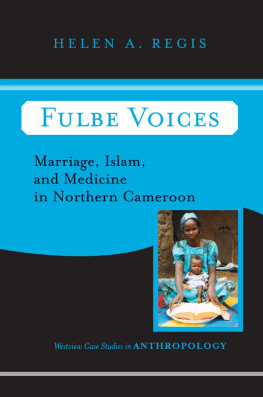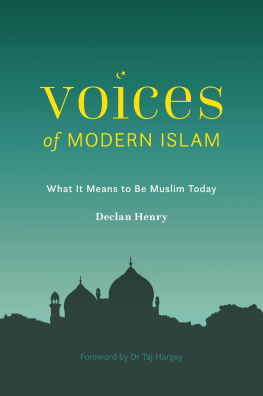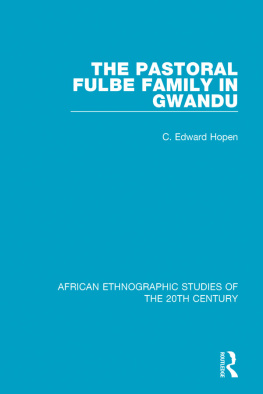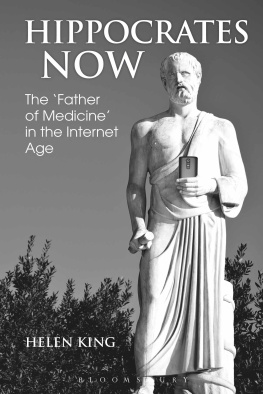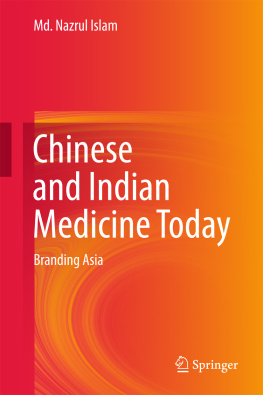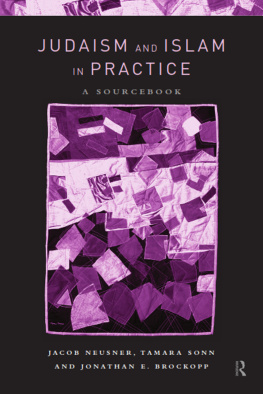Fulbe Voices
Westview Case Studies in Anthropology Series
Series Editor: Edward F. Fischer,
Vanderbilt University
Fulbe Voices: Marriage, Islam, and Medicine in Northern Cameroon,
Helen A. Regis (Louisiana State University)
Daughters of Tunis: Women, Family, and Networks in a Muslim City,
Paula Holmes-Eber (University of Washington)
Tecpn Guatemala: A Modern Maya Town in Global and Local Context,
Edward F. Fischer (Vanderbilt University) and
Carol Hendrickson (Marlboro College]
Forthcoming:
The Lao: Gender, Power, and Livelihood,
Carol Ireson-Doolittle (Willamette University) and
Geraldine Moreno-Black (University of Oregon)
First published 2003 by Westview Press
Published 2018 by Routledge
711 Third Avenue, New York, NY 10017, USA
2 Park Square, Milton Park, Abingdon, Oxon OX14 4RN
Routledge is an imprint of the Taylor & Francis Group, an informa business
Copyright 2003 by Helen A. Regis
All rights reserved. No part of this book may be reprinted or reproduced or utilised in any form or by any electronic, mechanical, or other means, now known or hereafter invented, including photocopying and recording, or in any information storage or retrieval system, without permission in writing from the publishers.
Notice:
Product or corporate names may be trademarks or registered trademarks, and are used only for identification and explanation without intent to infringe.
A Cataloging-in-Publication data record for this book is available from the Library of Congress.
ISBN 13:978-0-8133-3816-3 (pbk)
ISBN 13:978-0-8133-4035-7 (hbk)
Series Editor
Preface
In many ways, what makes anthropology unique among the social sciences is a focus on ethnographic fieldwork. We go there (be it the remote reaches of Africa or just down the block) to study them (who are variably conceived as either more or less like us). It is from the personal, dialectic encounters of fieldwork that we build up our perspectives and produce anthropological understanding. Dealing with real people and the intimacies of their lives makes this a difficult project, but it provides the best way to comprehend the world around us in terms of both the sensual practice of quotidian reality and the abstractions of high theory.
A great deal of what anthropologists learn in the field comes from conversations, sometimes extraordinary but most often mundane. We place high value on what the people we study ("collaborators" more than mere "informants") have to say Through such dialogues we float ideas, testing the waters of cultural understanding and moving toward an inter-subjective sense of mutual comprehension.
Helen Regis focuses on Fulbe Voices in this engaging account of life in a small town in Northern Cameroon. We benefit from Regis's sensitive ear as she relates how Fulbe individuals talk about their lives; we hear in their own words about their regrets and hopes, fears and desires, and struggles with the world in which they live. In writing this book, Regis builds upon recent discourse-centered approaches to culture in the most productive way She does not hit us over the head with rigid theoretical models, rather she interrogates theory with field data, using it to elucidate the patterns and contradictions of Fulbe life that emerge from lived experience and daily conversations. The result is an artful ethnography, equally illuminating both in terms of its specific descriptions and its critical application of theory.
The significance of this work rests with its ability to convey the vast complexity and fluidity of the rhythms of daily life in Domaayo. Regis has a sharp ethnographic eye, and her narrative transports us to the local Koranic school, allows us to witness the preparations for a boy's circumcision, and makes us privy to women's hushed conversations in the kitchen. We discover that the Fulbe are not the homogeneous, insulated sort of culture group anthropologists of an earlier era sought out. Local patterns of life are ever changing constructions marked by contradiction as much as conformity.
The Fulbe of Domaayo are overwhelmingly farmers and yet their self-perception is built around an image of themselves as noble pastoralists (as opposed to the "pagan" farmers of the countryside). This is a decidedly Muslim society, and yet one that practices its own hybrid form of the Islamic faith. It would be easy to write off these seemingly logical inconsistencies as merely the irrationality of culture, but Regis shows that the Fulbe with whom she converses are not plagued by cognitive dissonance. They are too busy living their lives, hemmed in by structural constraints and yet fully possessing the agency and intentionality to adapt to new circumstances and engage larger systems in a manner consistent with (although not determined by) their own cultural logics.
The Fulbe have a code of behavior known as pulaaku that governs the expression of emotions. Pulaaku reflects a highly stoic sensibility that to outsiders may seem like a rigid and constraining code of behavior. But this is not some rigid, hidden hegemonic structure. Regis shows that people frequently discuss pulaaku , debating its virtues and finer points. More important, it is a code that is worked out through practice, open to variable interpretations, contestation, and change. Even the most institutionalized rituals, such as male circumcision, are not without local controversy. Thus, Regis shows that the Fulbe are not merely enacting age-old cultural paradigms, but they are actively constructing an ever emergent future.
In a similar fashion, Regis contextualizes Fulbe structures of kinship and medical practices. In anthropological classifications, the Fulbe are a polygynous culture, meaning that a man may have more than one wife. Regis takes us beyond this structural fact to show how polygyny plays out on the ground. She shows, for example, the subtle political means through which wives vie for status. She also demonstrates how the Fulbe deal with pain and sickness in idiosyncratic and yet conventionalized ways that link them (through the local health center) to the larger milieu of World Bank politics and neoliberal economic reforms.
Fulbe Voices makes an important contribution to the Westview Case Studies in Anthropology series and to the discipline as a whole. This series presents works that recognize the peoples we study as active agents enmeshed in global as well as local systems of politics, economics, and cultural flows. There is a focus on contemporary ways of life, forces of social change, and creative responses to novel situations as well as the more traditional concerns of classic ethnography. In presenting rich humanistic and social scientific data borne of the dialectic engagement of fieldwork, the books in this series move toward realizing the full pedagogical potential of anthropology: imparting to the reader an empathetic understanding of alternative ways of viewing and acting in the world as well as a solid basis for critical thought regarding the historically contingent nature of ethnic boundaries and cultural knowledge.
Fulbe Voices addresses current theoretical issues in anthropology in a lively and accessible style. It advances our understanding of cultural diversity while uncovering the often hidden webs of global relations that affect us all. And, most important, it coveys the rich texture of Fulbe life in Domaayo at the turn of the twenty-first century.


